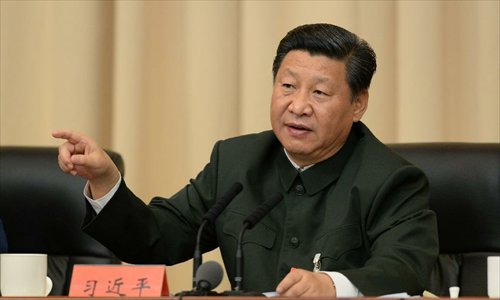Party commands gun: Xi
Meeting stresses CPC grip on the military

Chinese President Xi Jinping, also general secretary of the Communist Party of China (CPC) Central Committee and chairman of the Central Military Commission (CMC), addresses a military political work conference held in the township of Gutian, a former revolutionary base, of Shanghang County in southeast China's Fujian Province, October 31. The conference is held from October 30 to October 31. Photo:Xinhua
At a military political work conference which ended on Sunday, Chinese President Xi Jinping said that the Communist Party of China (CPC) has absolute control over the military, and called for serious reflection on the violations of discipline and law committed by former general Xu Caihou.
"The Party commands the gun," Xi, also general secretary of the CPC Central Committee and the Central Military Commission (CMC), said at a military political work conference held in a former revolutionary base in Gutian, Fujian Province. He stressed that the principle of the Party leading the army should always be firmly upheld, the Xinhua News Agency reported.
The president said that ideological and political development are crucial to building the military, and are the keys to safeguarding the CPC's absolute command of the troops.
Gutian, an old revolutionary base, has tremendous historical significance. The Gutian Meeting, widely considered a milestone for the CPC and the People's Liberation Army (PLA), convened in 1929 to set the tone for the army's political work during the revolutionary era. The meeting also helped establish the fundamental principle for the CPC's construction of a military: absolute control of the Party over the military.
"In today's China, without the leadership of the CPC, the military could easily fall into an uncontrolled state," Wang Zhanyang, a professor with the Central Institute of Socialism, told the Global Times.
"The absolute leadership of the Party prevents the military coups that frequently occur in some Latin American and Asian countries," Wang further noted.
Wang's opinion was echoed by Xu Yaotong, a professor with the Chinese Academy of Governance.
"Unlike Western countries, China has only one ruling party. Thus the country faces different conditions regarding the relationship between the Party and the military," Xu told the Global Times.
In a separate article, Zheng Yongnian, director of the East Asian Institute at the National University of Singapore, wrote that "In many developing countries, nationalization of the military is usually more complicated than in developed countries … In fact, the essential issue with nationalization of the military is whether the military can be controlled by the government."
"Despite the fact that the military plays a key role in China's politics, there has never been any political turbulence caused by military intervention. This has something to do with CPC's effective leadership over the army," Zheng wrote.
Days before the conference, the PLA Daily published a series of articles highlighting Party control of the military, refuting Western arguments regarding the nationalization of a country's military forces.
"Foreign hostile forces preach the nationalization and de-politicization of the military, attempting to muddle our minds and drag our military out from under the Party's flag," one of the articles said.
"The [goal of] nationalizing the military is to divorce the military from the Party's leadership and to overthrow the Party's ruling position, which is completely against the CPC's [governing] principles," Xu said.
The CPC's absolute leadership over the military has been written into China's national defense law, the Legal Daily reported.
In the conference, Xi also noted that there were serious problems in the army's ideological and political development. He enumerated those problems as faith, Party principles, revolutionary spirit, discipline, ideology and work styles, adding that management of officials is "too lax" and that the military's supervision system is flawed.
The lessons learned from the case of ex-general Xu Caihou deserve profound consideration, and any lingering negative influence from the case must be swept away, Xi said.
Xu Caihou, the former vice-chairman of CMC, was expelled from the Party and put under investigation for taking a huge amount of bribes and helping others get promotions.
"We will never slacken [our] efforts to deepen the fight against corruption in the army," said Xi, pledging to purify army cadres and continue a sustained, effective crackdown on graft.
Professor Xu Yaotong believed that punishing Xu Caihou reflected China's determination to use laws to regulate the military.
At the Fourth Plenum of the 18th Central Committee of the CPC, the Party said it will create a system to serve the "socialist rule of law with Chinese characteristics."
"Governing the military by law will provide an institutional guarantee for the CPC's leadership of the military," Xu Yaotong said.
Xi also stressed the fighting capacity of the military in the conference, saying it is the "sole criterion for testing troops and assessing military officers," Xinhua said.
To strengthen the military's ideological and political development, Xi urged the troops to have a strong sense of Party principles and interests, to tighten the management of high-ranking and middle-level officers, strengthening the anti-graft campaign and military's fighting spirit, and striving for innovation in political development, the PLA Daily reported on Sunday.
Xinhua contributed to this story